Climate Economic

What are the economic implications of climate change on international relations ?
Climate change has significant economic implications that can affect international relations in various ways, including impacts on agriculture, energy, tourism, trade disputes, migration, and opportunities for cooperation or competition. Countries must work together to address this global challenge and mitigate the negative economic impacts of climate change while strengthening diplomatic ties.

How does climate change impact the social and economic development of countries hosting climate refugees ?
Climate change leads to displacement of people, creating challenges for hosting countries in social and economic development. Social impacts include increased population, cultural conflicts, security concerns, and integration challenges. Economic impacts involve strained resources, unemployment issues, depletion of natural resources, and financial burden. Addressing these challenges requires coordinated efforts from various stakeholders.

How do climate change negotiations affect global trade and economic systems ?
Climate change negotiations play a crucial role in shaping global trade and economic systems. These negotiations aim to find solutions to the challenges posed by climate change, such as reducing greenhouse gas emissions, promoting renewable energy sources, and protecting biodiversity. The outcomes of these negotiations have far-reaching implications for international trade, investment, and economic development. In this article, we will explore how climate change negotiations affect global trade and economic systems. One of the key impacts of climate change negotiations on international trade is the imposition of tariffs and subsidies on goods and services that contribute to climate change. For example, countries may impose higher tariffs on imported goods that are produced using high levels of carbon emissions or other environmentally harmful practices. Similarly, governments may provide subsidies to domestic industries that adopt sustainable practices or invest in renewable energy technologies. These measures can create trade barriers and distort market competition, affecting global trade patterns. Another way in which climate change negotiations can influence international trade is through the implementation of carbon pricing mechanisms, such as carbon taxes or cap-and-trade systems. These mechanisms aim to internalize the external costs of carbon emissions by making polluters pay for their emissions. As a result, companies that rely heavily on fossil fuels or produce high levels of emissions may face increased costs, making their products less competitive in global markets. On the other hand, companies that invest in low-carbon technologies or adopt sustainable practices may gain a competitive advantage. Climate change negotiations often lead to the adoption of stricter environmental standards and regulations at both national and international levels. These standards can affect international trade by creating compliance costs for exporters and importers. For instance, companies that export goods to countries with stringent environmental regulations may need to invest in cleaner production processes or face penalties for non-compliance. Similarly, importers may prefer to source goods from suppliers that meet certain environmental standards, affecting trade flows and market access. Climate change negotiations also have significant implications for investment and economic development. As countries commit to achieving ambitious climate targets, there is an increasing demand for green finance and investment in sustainable projects. This can create new opportunities for investors and businesses that focus on renewable energy, energy efficiency, and other low-carbon sectors. However, it can also lead to capital flight from traditional fossil fuel industries, affecting economies that rely heavily on these sectors. Climate change negotiations often include provisions for technology transfer and innovation cooperation between developed and developing countries. This can help bridge the gap between countries with different levels of technological capabilities and promote sustainable development worldwide. By facilitating the transfer of clean energy technologies and supporting research and development efforts, climate change negotiations can foster economic growth and job creation in emerging markets. Finally, climate change negotiations address the urgent need for adaptation financing and support for vulnerable communities affected by climate change. This includes funding for infrastructure improvements, disaster risk reduction, and other measures that help countries adapt to changing climate conditions. While these efforts are essential for protecting human lives and livelihoods, they also represent significant economic opportunities for businesses involved in climate resilience and adaptation services. In conclusion, climate change negotiations have far-reaching implications for global trade and economic systems. By imposing tariffs and subsidies, implementing carbon pricing mechanisms, setting environmental standards, promoting green finance and investment, facilitating technology transfer and innovation, and providing adaptation financing and support, these negotiations shape the future direction of international trade and economic development. As we continue to grapple with the challenges posed by climate change, it is crucial for policymakers, businesses, and civil society to work together to ensure that our responses to this global challenge are aligned with our collective goals for sustainable prosperity.

What are the potential economic impacts of implementing the Paris Climate Agreement ?
Implementing the Paris Climate Agreement could have various economic impacts, including stimulating innovation and job creation in renewable energy sectors, reducing fossil fuel dependency, improving public health, and promoting green growth. However, there may also be short-term costs of transition, impacts on traditional industries, adjustment for businesses, and global economic imbalances. To mitigate negative impacts, governments and organizations can provide support for workers transitioning to new industries, implement carbon pricing mechanisms, engage in public-private partnerships, and cooperate internationally. Overall, the long-term benefits of avoiding catastrophic climate change outweigh the short-term economic costs, making the agreement a crucial step toward a sustainable future.

In what ways do economic factors influence the development and assessment of climate policies ?
Economic factors play a crucial role in the development and evaluation of climate policies, affecting decision-making processes, implementation measures, and assessments of effectiveness. These influences include cost-benefit analysis considering both direct and indirect costs, as well as quantifying avoided costs and non-market benefits. Economic growth and development must balance immediate needs against long-term sustainability goals, potentially leading to tension between current jobs and investment in cleaner technologies. International trade and competitiveness are impacted by concerns over carbon leakage and green trade barriers. Public acceptance and political will are influenced by perceptions of fairness and economic impacts on different income groups, while innovation and technology development depend on investments in research and development and the affordability of technology transfer. Overall, achieving effective climate action requires a careful consideration of economic dynamics alongside environmental objectives.

What are the potential economic benefits of sharing climate information ?
The potential economic benefits of sharing climate information include improved decision making through better planning and management, risk assessment and mitigation, increased efficiency and productivity, innovation and new business opportunities, and growth of the green economy. By leveraging this information effectively, businesses, governments, and individuals can adapt to changing climatic conditions while minimizing risks and maximizing economic gains.
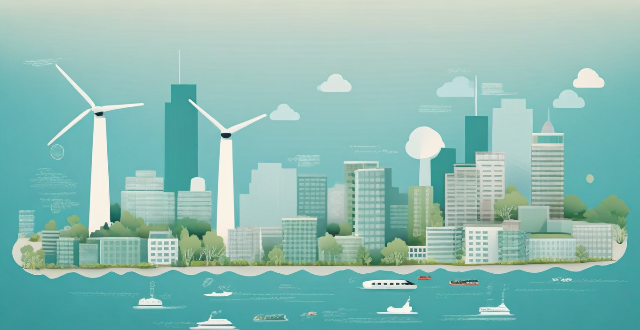
What are the economic implications of a climate emergency ?
The climate emergency, primarily caused by human activities, has significant economic implications affecting various sectors of the global economy. These include impacts on natural resources such as water scarcity, soil degradation, and energy supply; loss of biodiversity affecting ecosystem services and tourism; reduced crop yields and livestock production affecting agriculture and food security; risks to infrastructure and urban areas from flooding and heat waves; direct and indirect effects on human health; and broader impacts on global economic growth and international trade. Addressing these challenges requires coordinated efforts from governments, businesses, and individuals around the world to reduce greenhouse gas emissions and adapt to the changing climate.
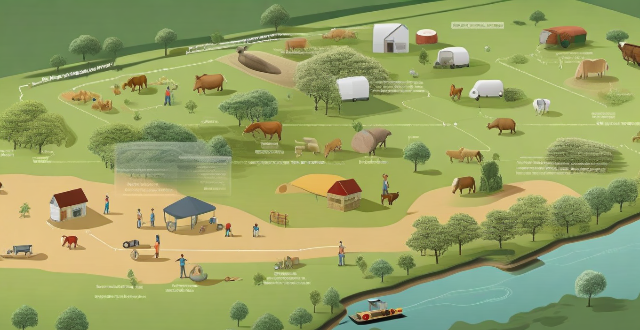
What are the economic consequences of climate change ?
The article discusses the economic consequences of climate change, including its impact on agriculture, tourism, energy, and infrastructure. In agriculture, decreased crop yields, loss of biodiversity, and increased extreme weather events can lead to higher food prices and reduced agricultural income for farmers. In tourism, loss of natural attractions, changes in seasonality, and health risks can result in reduced tourism revenue for affected regions. In energy, increased demand for cooling systems, disruption of energy production facilities, and transition to renewable energy sources can create new economic opportunities but also require significant investment and adaptation. In infrastructure, damage to critical infrastructure like roads, bridges, and buildings can result in costly repairs and replacements for governments and private sector organizations. Addressing these challenges requires coordinated action by governments, businesses, and individuals to reduce greenhouse gas emissions and adapt to the changing climate.
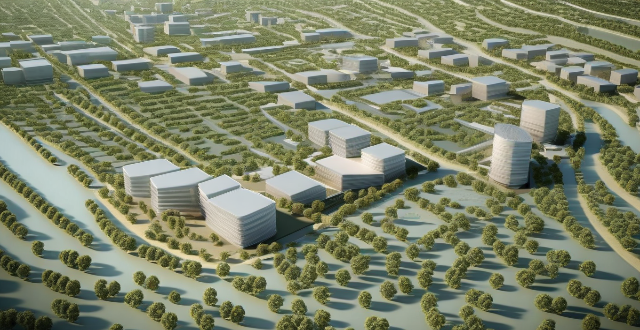
How do economic systems contribute to environmental problems and climate change ?
Economic systems, especially capitalism and industrialization, significantly impact the environment by promoting overproduction, waste, and reliance on fossil fuels. Issues such as built-in obsolescence, global trade emissions, and exploitation of natural resources exacerbate environmental problems. Additionally, population growth and urbanization increase consumption, while market failures and regulatory gaps often overlook environmental costs. Addressing these challenges requires a shift in economic priorities towards sustainability.
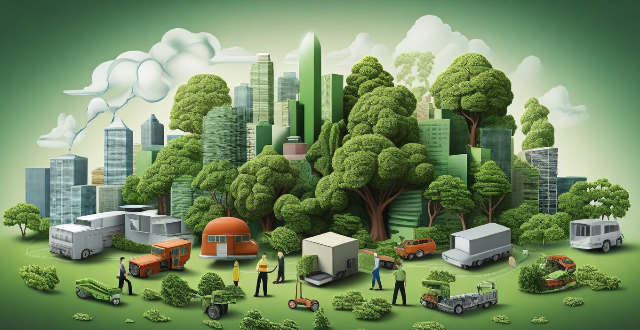
How do climate commitments impact economic growth and development ?
The impact of climate commitments on economic growth and development is multifaceted, with both positive and negative aspects. On the positive side, these commitments stimulate innovation in renewable energy sources and energy efficiency, create new markets for green products and services, improve public health by reducing air pollution, and enhance international cooperation. On the negative side, there are transition costs associated with shifting from fossil fuels to renewable energy sources, potential job displacement in traditional industries, trade-offs between environmental protection and economic growth, and unequal distribution of benefits and costs. Despite these challenges, prioritizing sustainability can lead to long-term economic growth while protecting the environment for future generations.

How can we convince skeptics about the importance of climate action ?
The text discusses the importance of convincing skeptics about the urgency and effectiveness of climate action. It outlines strategies such as providing accessible information, highlighting economic and health benefits, sharing personal stories, supporting beneficial policies, and using visual tools to illustrate potential future scenarios. The goal is to address misinformation, perceived economic concerns, and lack of trust in scientific consensus, ultimately aiming to build a broader coalition committed to combating climate change.
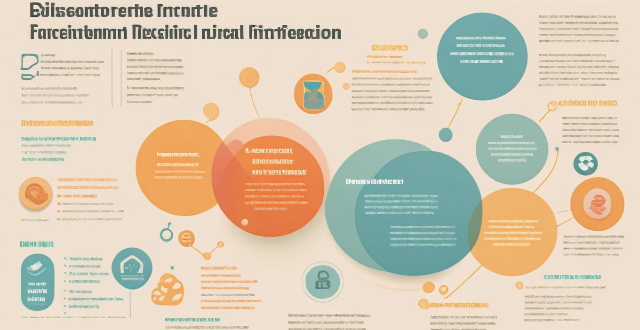
What are the economic implications of climate disasters ?
Climate disasters have significant economic implications, including direct costs such as infrastructure damage and agricultural losses, indirect costs like lost productivity and investment uncertainty, and global impacts on trade and commodity prices. Addressing climate change is crucial for protecting the economy and ensuring sustainable development.
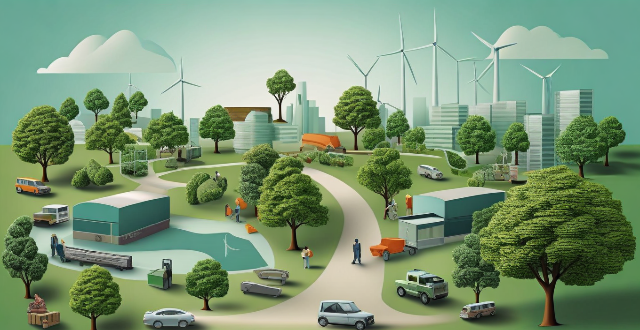
What are the economic implications of enacting stringent climate change legislation ?
The article discusses the economic implications of stringent climate change legislation, which include job creation in renewable energy and green infrastructure sectors, potential increases in energy and food prices, new business opportunities in innovation and carbon trading, and investment in clean technology leading to economic growth. However, there are also short-term transition costs and job displacement issues. Despite these challenges, the long-term benefits such as improved air quality and increased resilience against natural disasters make the implementation of such legislation beneficial for future generations.

What are the economic benefits of taking climate action ?
The text discusses the economic benefits of taking climate action, such as job creation in renewable energy and green infrastructure sectors, innovation driven by research and development, cost savings due to avoided climate-related damages and improved health from reduced pollution, and enhanced national competitiveness through attracting talent and investment.

How can climate and environmental policies be designed to promote sustainable economic growth ?
This text discusses the integration of environmental considerations into economic planning, promoting renewable energy sources, encouraging energy efficiency, supporting green infrastructure, promoting circular economy practices, strengthening environmental regulations, and fostering international cooperation to promote sustainable economic growth.
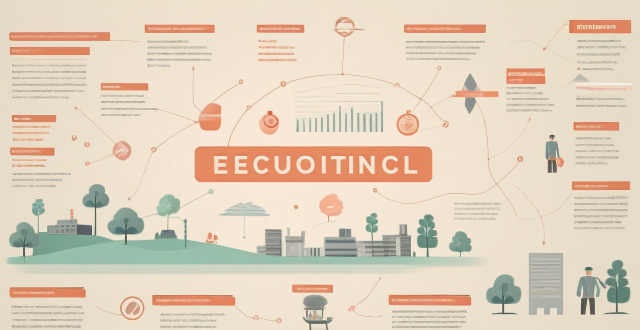
How does climate cooperation impact global economic growth ?
Climate cooperation has a positive impact on global economic growth by fostering new industries, promoting international trade and investment, stimulating innovation and research, enhancing resilience against climate impacts, and encouraging policy coherence and stability.

What are the potential economic benefits of investing in climate adaptation ?
Investing in climate adaptation can bring about several potential economic benefits, including reduced costs of disaster response and recovery, increased resilience of infrastructure and assets, enhanced productivity and efficiency, new business opportunities, and improved health outcomes. These benefits make it an essential component of any comprehensive strategy for addressing climate change and its impacts on our economy and society.

Can we achieve the SDGs without addressing climate change ?
The text discusses the interdependence between achieving the Sustainable Development Goals (SDGs) and addressing climate change. It highlights how various SDGs are directly impacted by climate change, such as health and well-being, food security, economic growth, and social equity. The text also explains how pursuing the SDGs can contribute to climate action through initiatives in energy innovation, sustainable consumption, urban planning, and global partnerships. It further outlines challenges that may arise if climate change is not addressed, including loss of biodiversity, water scarcity, migration, and economic instability. The conclusion emphasizes the need for an integrated approach that considers climate action in efforts to achieve the SDGs, ensuring a more resilient future for all.

How can we balance economic development and water resource protection ?
Water resources are crucial for economic development but must be protected to ensure sustainability. Strategies for balancing these goals include prioritizing sustainable practices, implementing regulatory measures, fostering collaboration and partnerships, investing in infrastructure and technology, and educating and creating awareness. By adopting these approaches, we can achieve a balance between economic growth and water conservation, ensuring long-term sustainability for all.

What are the consequences of not addressing climate debt ?
Addressing climate debt is crucial to mitigate environmental degradation, social injustices, and economic instability. Failure to do so exacerbates global warming effects like loss of biodiversity, sea level rise, and extreme weather events. It also leads to inequality, health issues, food insecurity, economic downturn, investment risks, and job losses. Recognizing and addressing climate debt is essential for achieving global sustainability goals and ensuring peace and justice worldwide.

What are the economic benefits of biodiversity ?
Biodiversity plays a significant role in the global economy by providing various economic benefits. These include increased resilience to climate change, support for sustainable agriculture, tourism revenue, pharmaceutical and medical research opportunities, ecosystem services, fisheries and food security, cultural and aesthetic value, innovation and education, risk management and insurance, and trade and livelihoods. Preserving biodiversity is crucial for maintaining these economic benefits across different sectors.
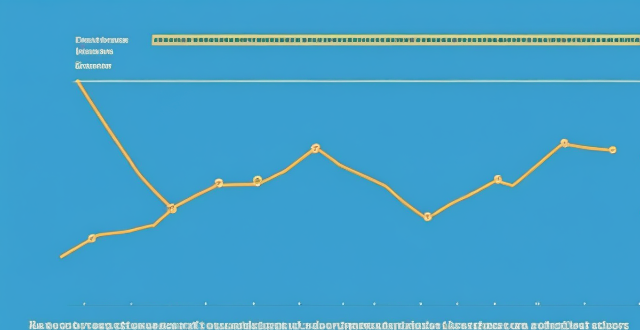
How do economists assess the costs and benefits of climate change negotiations ?
Economists use a cost-benefit analysis framework to assess the economic implications of climate change negotiations, considering various factors and uncertainties to inform policymakers about the economic implications of different strategies.

How does climate governance affect sustainable development goals ?
Climate governance plays a pivotal role in shaping the achievement of sustainable development goals (SDGs). The interconnectedness between environmental preservation and socio-economic advancement necessitates a comprehensive understanding of how climate policies and actions influence the broader spectrum of global development objectives. ## **Impact on Individual SDGs** ### *Goal 2: Zero Hunger* Climate governance directly influences food security by addressing factors such as droughts, floods, and temperature fluctuations that can disrupt agricultural productivity. Effective climate policies can help to: - Ensure stable crop yields through improved irrigation systems and drought-resistant crops. - Mitigate the effects of extreme weather conditions on farming communities. - Promote sustainable land use practices to prevent soil degradation. ### *Goal 7: Affordable and Clean Energy* The transition towards renewable energy sources is at the heart of both climate governance and sustainable energy goals. Policies that encourage the adoption of clean energy technologies contribute to: - Reducing greenhouse gas emissions associated with traditional fossil fuel consumption. - Increasing access to electricity in off-grid areas using solar or wind power. - Creating new economic opportunities in the renewable energy sector. ### *Goal 13: Climate Action* This goal is inherently linked to climate governance, as it calls for urgent action to combat climate change and its impacts. Efficient climate policies can lead to: - Implementation of emission reduction strategies. - Enhanced resilience to natural disasters. - Promotion of environmentally friendly industries and jobs. ## **Cross-Cutting Impacts** ### Health and Well-being Climate governance affects public health outcomes by addressing air quality issues and reducing exposure to extreme weather events. This contributes to achieving: - **Goal 3: Good Health and Well-being** by minimizing climate-related health risks. ### Economic Growth Policies that foster green economies and low-carbon development pathways are crucial for: - **Goal 8: Decent Work and Economic Growth** by creating sustainable job opportunities. - **Goal 9: Industry, Innovation, and Infrastructure** through investment in green technology and infrastructure. ### Social Equity Climate governance also has implications for social equity and inclusion, particularly when considering the disproportionate impacts on vulnerable populations: - **Goal 10: Reduced Inequalities** by ensuring that climate adaptation and mitigation efforts do not marginalize already disadvantaged groups. ## **Conclusion** In conclusion, climate governance is an integral component of advancing sustainable development goals. By prioritizing climate action, nations can make strides in eradicating poverty, achieving food security, promoting health and well-being, and fostering economic growth while protecting the planet for future generations. The synergistic relationship between climate governance and the SDGs underscores the necessity for integrated policy approaches that consider environmental sustainability alongside social and economic development.
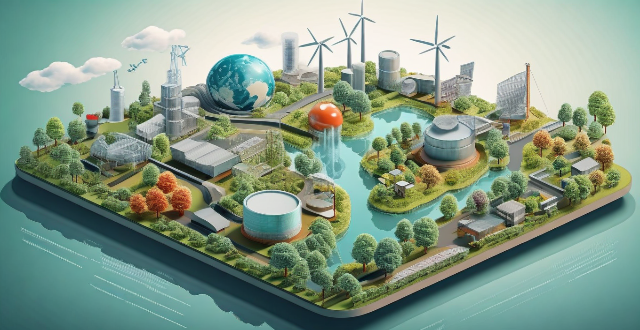
What are the potential economic impacts of increased climate variability ?
This article discusses the potential economic impacts of increased climate variability on various sectors, including agriculture, water resources, energy, and tourism. It highlights how changes in weather patterns can lead to reduced crop yields, increased input costs, loss of biodiversity, droughts and floods, reduced water availability, higher demand for cooling systems, altered tourist destinations, and extreme weather events. The article emphasizes the importance of recognizing these potential impacts and taking steps to mitigate them through sustainable practices and adaptation strategies to build a more resilient economy that can withstand the challenges posed by a changing climate.
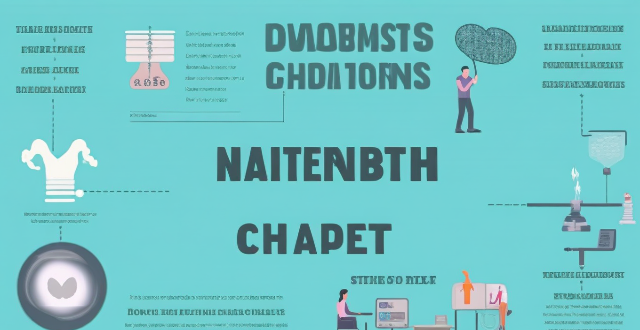
What are the economic costs and benefits of adapting to climate change ?
The text discusses the economic costs and benefits of adapting to climate change, which include direct costs such as infrastructure upgrading and water management systems, indirect costs like economic disruptions and resource reallocation, direct benefits including increased resilience and improved efficiency, and indirect benefits such as job creation and technological innovation. The conclusion states that the long-term benefits of adapting to climate change outweigh the costs, leading to more resilient economies.

What are the economic costs of environmental degradation ?
The text discusses the economic costs of environmental degradation, which include both direct and indirect costs. Direct costs are easily quantifiable and include resource depletion, health impacts, agricultural losses, and infrastructure damage. Indirect costs are more difficult to quantify but still have significant economic impacts, such as lost biodiversity, reduced quality of life, social unrest, and climate change mitigation costs. The text emphasizes the importance of addressing environmental issues for long-term economic stability and growth.

What are the economic implications of the decisions made at climate summits ?
Climate summits like the UNFCCC COP have far-reaching economic implications, affecting sectors from energy to infrastructure and trade. Decisions made at these events can influence investment patterns, job creation, and national economies. Key impacts include shifts towards renewable energy, green innovation, changes in infrastructure, adjustments in fiscal policies, alterations in international trade dynamics, effects on natural resource management, and increased regulatory compliance costs. These decisions are crucial as they help shape a sustainable and climate-resilient global economy.
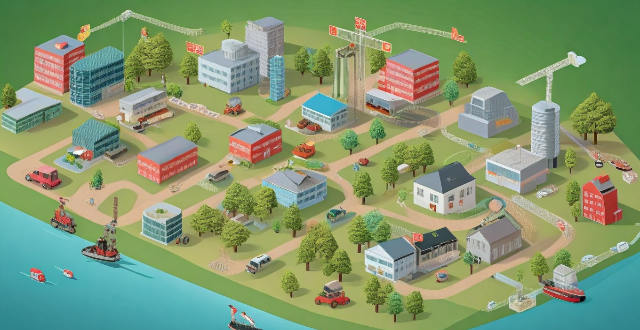
How can we balance economic development with climate action and human rights protection ?
Balancing economic development with climate action and human rights protection requires prioritizing sustainable development, integrating climate action into economic planning, protecting human rights, and collaborating across sectors. Governments and businesses should adopt policies and practices that promote renewable energy sources, reduce greenhouse gas emissions, encourage investment in green technologies, support small-scale farmers, promote fair trade practices, develop national climate plans, invest in research and development of new technologies, provide incentives for eco-friendly behaviors, ensure equal access to education, healthcare, and other basic services, protect the rights of marginalized communities, promote gender equality, enforce laws that protect workers' rights, establish cross-sectoral partnerships, encourage dialogue and consultation between stakeholders, support local initiatives, and encourage international cooperation.

What is the outlook for the European Union's economic recovery ?
The economic recovery of the European Union (EU) depends on political stability, global economic conditions, and domestic policies. Unity among member states and effective governance are crucial for managing crises and implementing growth-promoting policies. Global trade dynamics and supply chain disruptions also play a significant role. Domestically, fiscal stimulus, structural reforms, and a balanced green transition are key. The outlook is optimistic but uncertain, with many influencing factors.
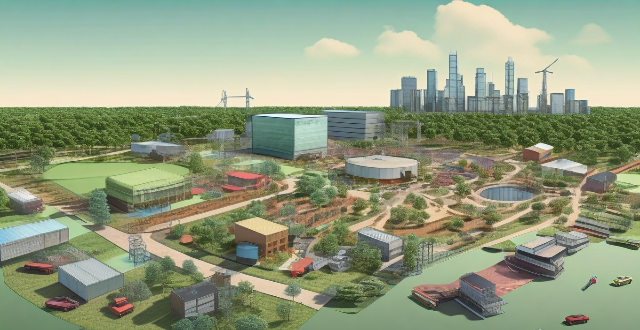
What are the potential drawbacks or challenges associated with climate action initiatives ?
Climate action initiatives are essential for mitigating the impacts of climate change, but they come with potential drawbacks and challenges. These can range from economic to social and political implications. Economic implications include job displacement in traditional fossil fuel industries, the cost of implementing renewable energy infrastructure, and economic inequality. Social and cultural implications involve changes in lifestyle and consumption patterns, as well as equity in access to clean energy solutions. Political and policy challenges include legislative hurdles, international cooperation, public perception, and misinformation. Environmental trade-offs involve impact on other ecosystems and sustainability of solutions. Addressing these challenges through comprehensive planning, stakeholder engagement, and continuous improvement is crucial for a just and effective transition to a low-carbon future.